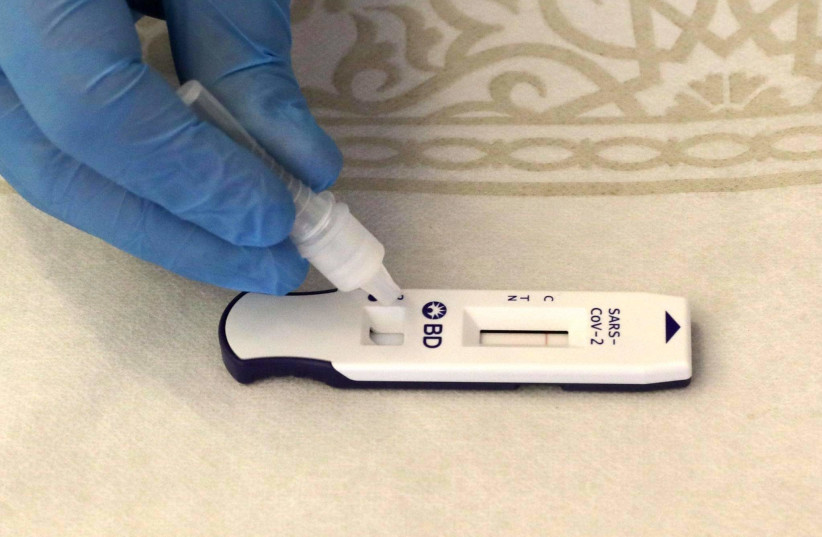I let down my guard a few weeks ago. This was before the Greek letter “Omicron” was associated with COVID-19 and we all thought being triple-vaxxed meant we were relatively safe.
So when friends invited my wife, Jody, and I to an indoor Hanukkah party, I opted to drop my mask entirely, even when I was not in the midst of ingesting the decadent sufganiyot on display.
A few days later, I started to feel sick. Sneezing, runny nose, a dry cough. I assumed it was my seasonal allergies, but when I spiked a fever 10 days later, I started to worry. The newer variants of COVID present differently than the original, with symptoms often resembling allergies or a nasty cold.
I had already purchased several rapid antigen test kits “just in case.” I swabbed my nose and squeezed four drops of potentially COVID-saturated liquid onto the control strip. I waited the requisite 15 minutes. A line appeared under the negative indicator.
Whew. I guess I dodged that bullet.

But when I glanced at the strip again an hour later, a second, blurry line had appeared under the indicator for “positive.”
Freaked out, I did another test. Same: negative at first, turning positive after an hour.
Now the instructions on the home test kit specifically state, “Do not read these results after 30 minutes.” That should have been enough to calm me down, but the fever, the aches, the coughing and my overactive imagination wouldn’t let it go.
It was 9 p.m. at night when Jody and I drove to the Kraft Stadium PCR testing facility in Emek Ha’arazim, near the Jerusalem neighborhood of Ramot.
The system is remarkably efficient. As you enter the queue of cars, an attendant hands you a flyer with a QR code. Scan it to open a web page, where you enter your name, ID number and why you’re here. (I ticked the box for “suspected symptoms.”) When the technician comes to swab your nose, your online “file” is already set up, and the results are sent by SMS.
The results arrived 12 hours later: also negative.
“You’ve got some virus,” my family doctor told me. “It’s not COVID and it’s not the flu.” (Another nasal swab at the clinic confirmed I was “negative” for influenza.) “Take pain killers, drink lots of water and rest.”
THE THING is, for the past two years, I haven’t gotten sick with any virus. I hear the same from friends. Masks, social distancing, avoiding indoor dining, concerts and synagogue have all contributed to a population that’s in some ways healthier than before the pandemic.
The US CDC recorded 1,316 cases of flu between September 2020 and January 2021. In the same period the year before there were 130,000 cases.
I never want to get sick again! I thought to myself.
Which is, of course, completely unrealistic. It goes against what it means to be human, which is to get sick from time to time.
My aversion is understandable. When I was diagnosed with non-Hodgkin’s follicular lymphoma in 2018, one of the guidelines my hematologist emphasized was that if I developed a fever higher than 100 Fahrenheit (37.7 Celsius), I needed to get to the ER straightaway. If whatever I had turned into pneumonia and my immune system was compromised, I could be, too.
So, it’s not surprising that any sign of illness would unnerve me. I have legitimate concerns.
Legitimate enough, though, that I should wear a mask in public indoor situations for the rest of my life? Never shake hands with a stranger? Cancel attendance at an event when there’s even the hint of illness?
When I was in grade school, I regularly attended class even when I was sick. Staying home was not socially acceptable. Ditto for work.
Since the start of the pandemic, that now seems insane. If you’re ill – whether it’s COVID or the common cold – stay home. Protect others.
“The decision to attend a gathering while unwell looks rather narcissistic,” writes Jenni Avins in The New York Times. “It says to your fellow attendees, ‘I know I risked your health by turning up here, but isn’t my presence worth it?’ Even if it’s not COVID, it’s never a good look – especially in flu season – to show up resembling an extra from [the movie] Contagion.”
Even though I was negative for COVID, I didn’t want to get Jody or any of my kids sick. So for the next week, I wore my Sonovia mask at home. It was a bit awkward and my glasses fogged up while I tried to watch TV. I didn’t even attempt to hold my new grandson.
Admittedly, I may be in a different category because of the cancer. But living in dread of what is essentially the human condition doesn’t seem healthy, either.
If I do eventually contract COVID – which, sadly, seems more likely than ever, given Omicron’s ability to break through vaccine protection – hopefully we will have treatments to keep people from getting severely ill or dying.
Monoclonal antibodies, the new antiviral pills from Merck and Pfizer, rejiggered vaccines and AstraZeneca’s Evushield prophylactic antibody cocktail for the immunocompromised all hold great promise.
Fighting even a “normal” virus took a lot out of me. I am leaning toward staying vigilant – if not for me, then for the sake of six-week-old Ilai Ze’ev. He deserves at least a few months of perfect health before he comes face-to-face (or is that mouth-to-nose?) with the inevitable, unavoidable viruses of modern life.
The writer’s book, Totaled: The Billion-Dollar Crash of the Startup that Took on Big Auto, Big Oil and the World, is available on Amazon and other online booksellers. brianblum.com
